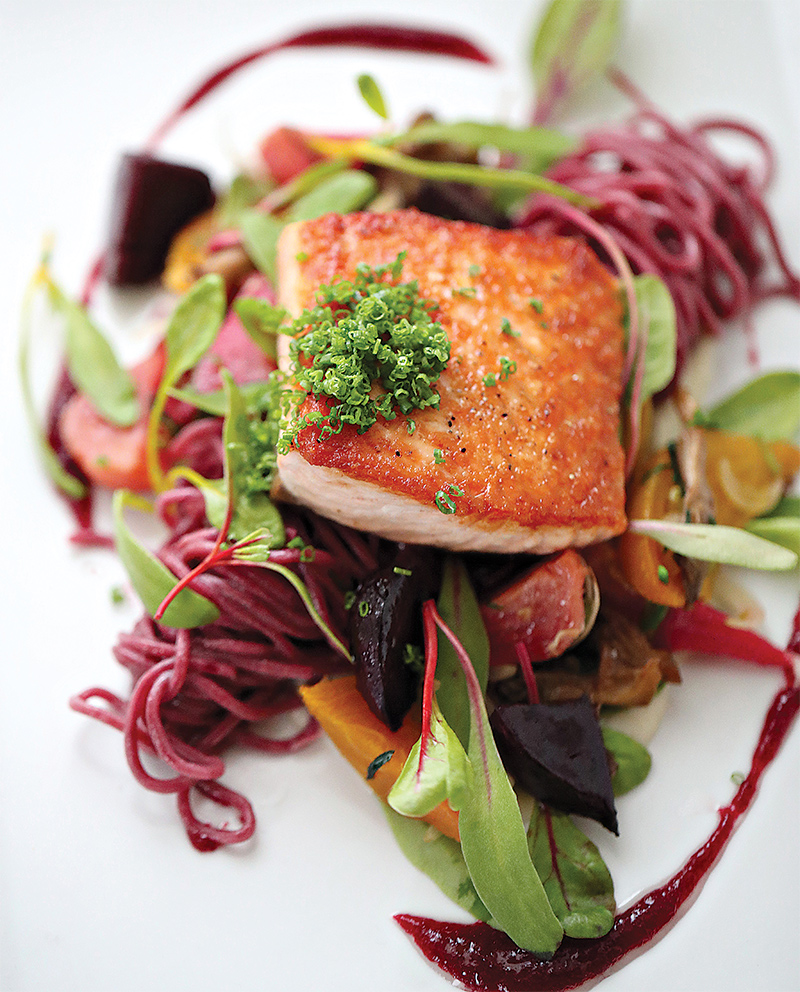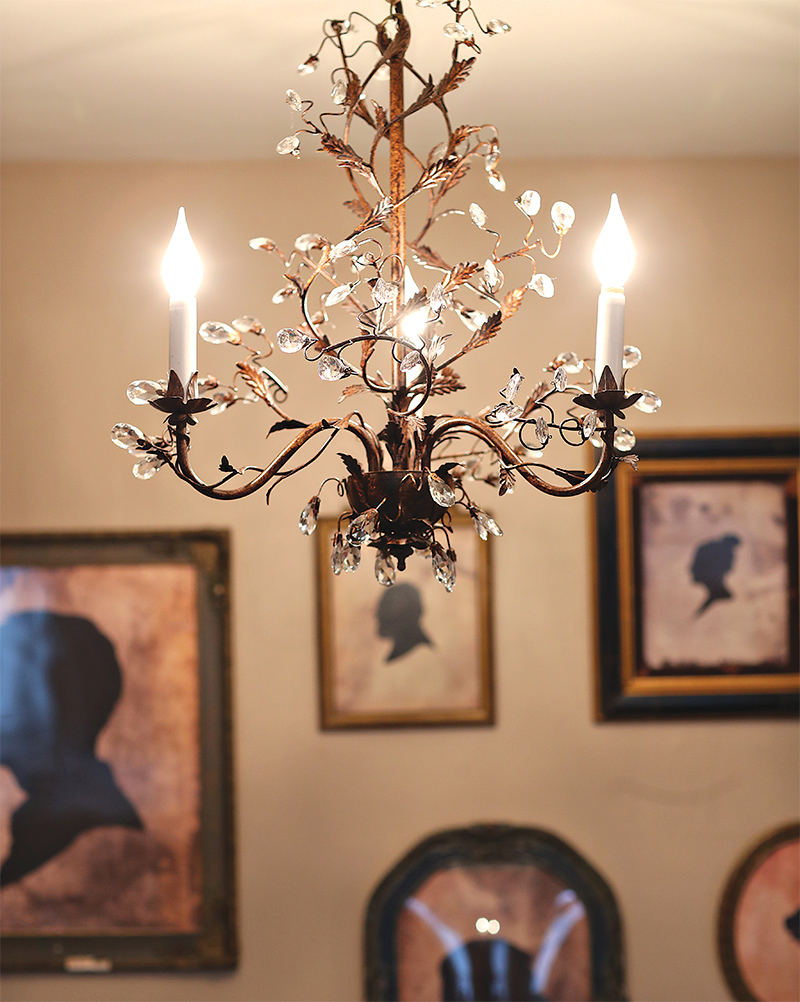It's remarkable to consider that Lehigh Valley Style has not really told the story of Bolete. Sure, its indefatigable chef, Lee Chizmar, has been voted best chef and the restaurant has won various accolades over the years, but we've never really taken you on an inside look at its concept. The restaurant, named for a type of mushroom, has twice been named to OpenTable's 100 Best Restaurants in America. In 2015, Chizmar landed among the semifinalists for best chef, Mid-Atlantic, from the James Beard Foundation (JBF). He's cooked dinners in New York for the JBF. It seems fitting, then, that at the precipice of their tenth year at Bolete, thousands of poached eggs, shucked oysters and sautéed mushrooms later, it's time for a sit down.
“Sometimes it seems like it was an eternity and sometimes it feels like it was yesterday,” he says.
After all, Bolete is their “daydream turned reality,” as they've often said. In ten years, much has happened with Chizmar and his wife, Erin Shea, who met in Boston when she was working the front of the house and he was the executive chef at Great Bay Restaurant. They brought the best of what they learned from roles in restaurants in Boston and San Francisco to Lee's home turf of the Lehigh Valley (he's a Salisbury Township native). Chizmar and Shea are still in those roles, but now they've also added on duties as parents to two young daughters. Bolete is still that warm, charming and earthy space, set in a stagecoach stop that dates to 1790. It's still a scratch-made kitchen, but a few things have changed, for sure. Chizmar says he uses less butter than he used to in cooking (read: more vegan soups) and in April 2016, he and Shea opened up Mister Lee's Noodles at the Easton Public Market, bringing that same fresh and local approach to ramen.
These days, the term “farm to table” is more widely embraced as a concept, even as the term itself has become something many chefs eschew (that's another story for another time).
However, when Bolete opened, farmers were somewhat surprised by the fact that Chizmar sought them out and that he would yes, indeed, buy all of those peppers or tomatoes or whatever it was they had in abundance. “The farming scene around here has changed remarkably in the past ten years,” he says. There are not only more farmers than there used to be in the region, but he says what they're growing is of incredibly high quality, as reflected in the dishes themselves, and the chalkboard wall on the tavern side detailing the purveyors du jour.

Bolete has had a palpable impact on advancing the mission of local food, but Chizmar's reach has expanded considerably—and we're not just talking noodles. Chizmar has paired with the 300-plus acre, organic Profeta Farms of Readington, New Jersey, to oversee its culinary operations. Set in Hunterdon County, Profeta, at press time, was in the process of constructing a massive, 25,000-square-foot farm-to-barn store set to open this summer. “I don't know that there's another facility like this, that has the capacity to change how so many people eat,” he says.
Chizmar's been buying Profeta's eggs for Mister Lee's Noodles, and his good friend John Place (of Keepsake Farm in Nazareth) is the manager there. Profeta exponentially expanded its farm store and will provide farm-fresh produce, on-farm education and tours and events, ready-to-eat meals, catering and Blue Apron-style meal plans. Chizmar says his approach will be “rustic.” In other words, simplified versions of what he's known for at Bolete: flavorful farm-fresh fare, with a reverence for the ingredients and the labor that goes into them. Farm-to-table has literally come full circle.
Don't panic. We know what you're thinking. Bolete isn't going anywhere.
The plan with Profeta has been hush-hush for a little while. Still, he says he's been “hesitant” to move forward—it's a big leap; plus, people are so intimately attached to Bolete, says Shea.
(It's not uncommon for their children to receive gifts from regular patrons, and Chizmar has cooked for people in the hospital.) Chizmar and Shea are thorough and careful when it comes to change. “We are cautious to keep to the same principles, the balance of flavors,” he says.
And the prospect of helping so many people learn more about food is too hard to pass up. It's a big leap in a number of ways; pragmatically speaking, Profeta's kitchen is enormous and very open (by design) in comparison to the mystical, postage-stamp-size one at Bolete, where, in the early days, Chizmar seemed like The Wiz, the man behind the curtain.
“Did I ever tell you about this recurring dream I used to have, where I am in the kitchen, we're going down in flames, and there's this doorway I've never seen before. It leads to this room with huge steam kettles and rows of island suites and I think, what the hell? Where has this been?” His eyes widen and he gesticulates when he tells this story. When he was walking through the roughed-in kitchen at Profeta, it felt eerily familiar—kind of like that dream.
The future at Bolete looks as delicious as ever. The last time I spoke with Chizmar at length, there was a conversation about closing the book on ten years' worth of recipes and starting fresh. That's already been happening, slowly but surely, with the most logical evolution to eating locally—embracing regional cuisine and modernizing it.

“I've been talking to Tod [Auman, of Dundore & Heister] about this. It's something we're both passionate about. We want to take the classics, those traditional recipes, and update them, modernize them,” he says. They're calling it Pennsylvania Modern heritage cuisine, and are in the stages of planning a James Beard dinner in New York City based on this concept.
This shift is subtle and doesn't require big fanfare; if you've been a regular at Bolete in the past few years, you may have noted a dish here or there pop up on their ever-changing menu that reflects creative takes such as the Pennsylvania “ham loaf” first course: head cheese, pepper cabbage, porcini mustard and mustard crackers.
The elements of those classic flavors—pork, pepper cabbage and mustard—are all there, with the Bolete spin. At Mister Lee's, which is directly across from Dundore & Heister at the Easton Public Market, the Dutch Ramen features pastrami, sauerkraut and a beef-mustard dashi. It's not exactly your typical bowl of ramen.
“It's tough—you have to be careful with Pennsylvania Dutch. We want to stay true to its tradition, but put that modern touch on it, without changing the heart of it. But if you look at the way they cooked, they preserved, pickled, all of this was for survival. They planted and used hardy crops,” he says.
Chizmar and his staff aren't at all limited, though; the tradition is an inspirational template, approached with equal parts respect and curiosity. “You don't see asparagus and peas in the cuisine, but that's something we are growing here,” so it might make its way into a dish, he says. Additionally, the Pennsylvania Dutch region has a history of growing saffron—you know, that expensive, pungent and golden-hued spice. The possibilities will likely surprise.
He also starts to tell the story of gumbis, a traditional dish that he says is sort of like a casserole served with a thick milk sauce. “We have a potato mushroom gumbis, and ours is adapted with a light béchamel and pork stock. But until our servers started aggressively explaining it, no one was ordering it. I think there was this sense of ‘I don't want to ask what gumbis is,'” he says. “We want people to be comfortable.”
What's happening at Bolete with modern Pennsylvania heritage cuisine is, to some extent, happening all over the country. It's the next evolution of farm-to-table—a hyper-regionalist approach that is by definition sustainable, favoring an understanding of the traditions that inform the local food ways, adapted to modern sensibilities. (Sean Brock and Southern food comes to mind most immediately.)
“People understand what New England, or Southern, or California cuisine is, but people don't come to Pennsylvania for Pennsylvania Dutch food,” he says.
That's about to change.
“I love Bolete, not as something I created or Erin has created, but something that we have all created together. I almost see it as a separate entity. You want it to be around forever, and be part of people's lives. The only way to do it is to evolve with your staff, let go of the reins a little bit,” he says.
“I couldn't do Mister Lee's without Mike and Cody over there. And it's fun to talk about what we're doing—I've opened this up more, we're brainstorming, we're all researching. Everyone is into it.”

Bolete
1740 Seidersville Rd. | Bethlehem | 610.868.6505 | boleterestaurant.com
Hours
Dinner: Tues.–Thurs.: 5–10 p.m., Fri. & Sat.: 5–11 p.m.; Brunch: Sun.: 10 a.m.–3 p.m.
Parking
A small lot on the premises and an adjacent lot they rent space from for spillover parking.
Reservations
Recommended
Payment
Visa, MasterCard, American Express
What to Order
As for cocktails, Shea suggests we “ask Stephen what he thinks is the most interesting thing on the menu,” as this talented mainstay behind the bar on Bolete's tavern side is always mixing something with seasonal and local ingredients. The farm-raised organic salmon is “gorgeous” says Shea, and the surf and turf oysters are a beloved item that's tough to resist—beef carpaccio, horseradish crème fraîche and pickled and crisp shallot. If you want a laid-back experience, hit the tavern side and order the cast-iron seared, grass-fed burger, with bacon, red onion, cheese, house-made chips and Liberty Gardens greens—mushroom marmalade or hand-cut fries optional. You can also order that item at their equally laid-back brunch—don't miss the signature Eggs Chizmar. The “Beat Bobby Flay Chicken Wings” call to mind Chizmar's recent appearance on the Food Network against the Iron Chef (Chizmar lost).
















